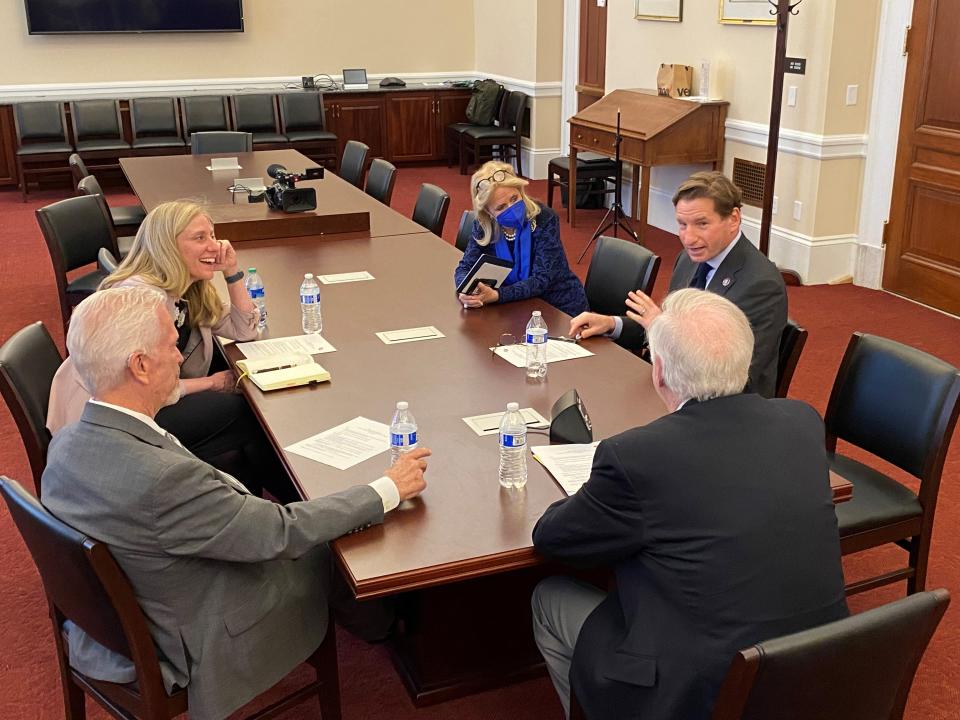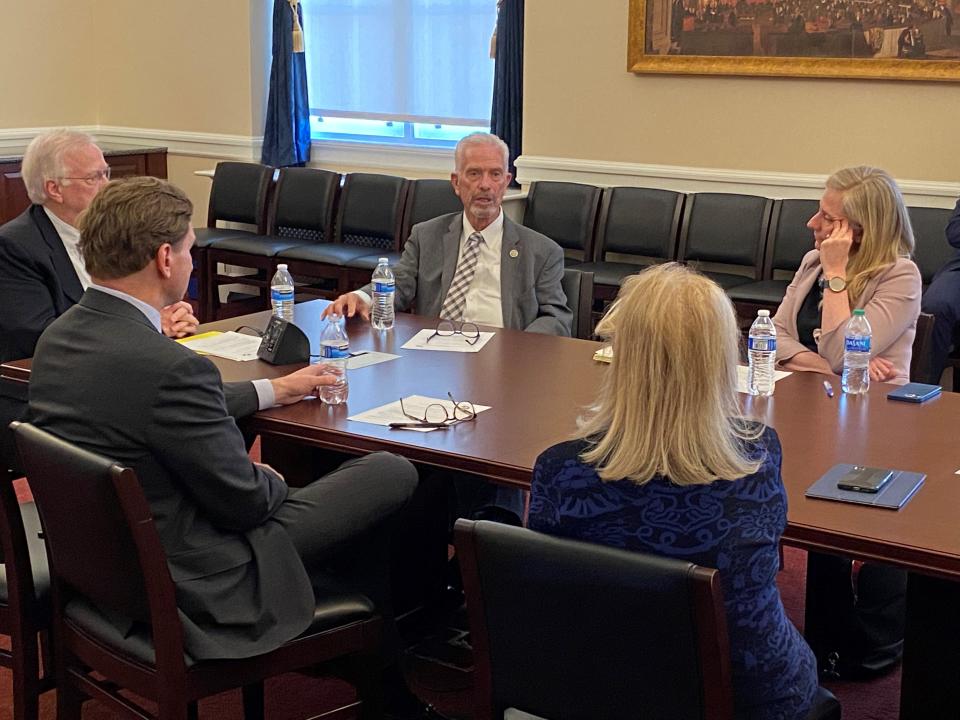Congress is fractured. So Democrats, Republicans went to family therapy – together. We were there.
- Oops!Something went wrong.Please try again later.
- Oops!Something went wrong.Please try again later.
WASHINGTON – They spoke of alcoholic fathers and cancer-stricken daughters; immigrant grandparents who inspired them and abusive parents they escaped. They shared jokes, comforted one another and even choked up.
For a few moments recently, seven House lawmakers – five Democrats and two Republicans – gathered in a high-ceilinged hearing room near the U.S. Capitol to shed their partisan armor and ditch their talking points. In two separate sessions moderated by a trained family therapist, they spun personal stories of triumph and heartache, engaging in the simple act of getting to know each other better.
The intimate get-togethers are part of a pilot program coordinated by Braver Angels, a group that works to bridge political differences among Americans, and the bipartisan congressional Problem Solvers Caucus.
The legislators are meeting amid one of the most vitriolic chapters of Congress, where feuding members avoid one another and the long shadow of the Jan. 6 attack on the Capitol divides Democrats and most Republicans.
Lawmakers, including top leaders, routinely insult one another. Some even lob threats. Metal detectors were installed outside the House floor since last year after Democrats expressed concerns about some of their GOP colleagues. The lingering threat of COVID-19 – where mask mandates only amplified blue and red divisions – has only increased the tension.
The skirmishes have grown so heated that it's inspired a group of lawmakers with opposing views to seek something akin to political mediation. That's led to the recent therapy sessions to connect lawmakers on a human level. And that could lay the foundation for larger sorts of compromises.
Only a few have signed up so far, but organizers are hoping to expand the program.
ORDER TO TESTIFY: Jan. 6 committee subpoenas House GOP leader Kevin McCarthy, 4 other House Republicans
CONTRASTING VERSIONS: ‘This is insane.’ Lawmakers relive Jan. 6 horror alongside fresh trauma of effort to rewrite history
"You just can't fight with people the same way when you know their hearts," Ohio Republican Bill Johnson told the three Democrats during one session after sharing stories of his childhood on a mule farm moving from town to town to escape an alcoholic father.
Johnson's personal tale touched the man across the table: Minnesota Democrat Dean Phillips, who said he believes compromise on Capitol Hill would be far easier if lawmakers knew one another on a more personal level.
"It's the first time I've heard Bill's life story. It really moved me. I'm surprised I'm emotional. But it angers me actually because it's so easy to fix. And So damn human to do and it's it's shameful that we don't invest in doing this because it's just so remarkably unifying."
Lawmakers 'who despise the institution'
It's unlikely a couple of sit-downs, no matter how much they help a few lawmakers connect, will dramatically lower the increasingly partisan temperature of Congress.
It starts at the top. House Speaker Nancy Pelosi, D-Calif., has called Republican leader Kevin McCarthy, R-Calif., a "moron," and McCarthy once said of Pelosi, "I never think it's productive when I talk to her."
The loudest – and angriest – voices in Congress continue to draw the most attention and raise millions in campaign contributions precisely because of their unwillingness to compromise.
PROFITING FROM POLARIZATION: Rep. Lauren Boebert and the politics of outrage: Why lawmakers reap rewards from firebrand tactics
Georgia GOP Rep. Marjorie Taylor Greene once accused Pelosi of treason (Greene said recently that she can't remember saying that. Colorado Republican Lauren Boebert last year made racist, Islamophobic comments about Minnesota Democrat Ilhan Omar. And the House censured Rep. Paul Gosar, R-Ariz., for posting an anime video that was edited to show him killing Rep. Alexandria Ocasio-Cortez, D-N.Y.

LISTENING SESSION: A Republican and Democrat walk into a town hall. Can they help fix Congress?
PRIMARIES MATTER: Think Congress is too partisan now? Primaries could magnify division as the number of swing districts shrinks
Rep. Debbie Dingell, a four-term Michigan lawmaker and one of the Democrats who attended the second session, said the emotion in Congress now borders on visceral at times.
"There are people – I don't even want to sit across the aisle - that really despise the institution and want to tear people down. I've never seen that before. ... We have 'em on our side too," said Dingell, whose late husband, John, served nearly 60 years in Congress. "I don't know how to deal with people that just don't want to work with each other. It's just respecting each other. Basic respect."
Enter William Doherty, a professional marriage counselor who also happens to be a Braver Angels co-founder. The white-haired professor at the University of Minnesota's Department of Family Social Science moderated the sessions.
He has been been working for decades life counseling combative couples on the verge of divorce. Lately, he's been spending time finding ways to keep lawmakers from their own acrimonious split.
"The goal is really to help them understand each other at a deeper level than policy, to understand each other as human beings and where they come from," Doherty told USA TODAY before the first of his two sessions. "A lot of times, we think that the policy difference means that we have a fundamental difference on our human values and aspirations.”
OPINION: Congress is polarized and broken. But Americans are more united than you might think.
Braver Angels formed after the 2016 elections, which amplified the nation’s partisan divisions. It has chapters across the country, bringing together red and blue voters in a larger dialogue aimed not at changing minds but at promoting dialogue.
Doherty has been working with lawmakers at the state and congressional levels recently, holding exercises with members of the New Hampshire legislature and, last summer, moderating a “common ground conversation" in Minnesota that featured Phillips and South Dakota GOP Rep. Dusty Johnson speaking with a small group of citizens.

The recent sessions on Capitol Hill featured members of the Problem Solvers Caucus, a bipartisan group of 58 House lawmakers – 29 Democrats and 29 Republicans – predisposed to compromise. While Doherty acknowledges the lawmakers he met with aren't the antagonistic voices in Congress, he said there's tremendous value in these sessions.
"People always say you're just preaching to the choir," he said. "And what I always say to that is: every social movement begins with a choir."
Sharing difficult life stories
USA TODAY was invited to attend the two sessions – the first on a late April Wednesday, the second the following day – with a handful of staffers who watched from the side. The first, lasting about a half-hour, featured Pennsylvania Republican Brian Fitzpatrick and New Jersey Democrat Josh Gottheimer, co-chairs of the caucus, who were joined by California Democrat Jim Costa. The second, about an hour, featured Bill Johnson, Phillips, Dingell and Virginia Democrat Abigail Spanberger.
Each session began with a simple nudge from Doherty asking lawmakers to share their personal life story and explain why they decided to take part in the exercise. What often followed was a powerfully personal conversation rarely shared even in semi-private settings.
Fitzpatrick, a former FBI agent, shared how his great uncle's death in the line of a duty as a New York City police officer inspired him to pursue a life of public service. And growing up in a large extended family (he has seven siblings) meant confronting tragedy at an early age.
"I've been to a lot of funerals as a very young kid. That certainly has an effect on you," he told the group. "It drills in your head at a very young age how short life is, how you only get one chance to do good."
Phillips spoke about his daughter, Pia, whose Hodgkin's lymphoma diagnosis at 13 and the ability of the family to cover medical costs shaped his support for expanded affordable medical care for those families that can't.
"It really affected my belief that we have to ensure that we have care for everybody who needs it, whenever they need it, no matter their circumstances," he said. "As for advantages and disadvantage, I just don't think luck alone and your zip code or your color or your family or your geography should be the determinant of your outcome."
Dingell drew the strongest reaction from her colleagues when she opened up about her father's lifelong struggle with mental illness and the threat he posed to his family, including the day she intervened to prevent him from shooting her mother. It made her a crusader for gun control, she said.
"I've lived with a man who shouldn't have had access to guns," she said.
An ugliness "infecting" both parties
Braver Angels plans to do more of these conversations if more members are interested.
"Good for them," said Norman J. Ornstein a congressional scholar at the American Enterprise Institute, a Washington think tank. "But how can you be anything but skeptical?"
Ornstein lays most of the blame at the feet of Republicans, whom he says have moved "in a more radical and combative direction" since the Jan. 6 assault on the Capitol. He point to the party's repudiation of Wyoming Rep. Liz Cheney and Illinois Rep. Adam Kinzinger – two of the loudest GOP critics of former President Donald Trump.
"When you have a party that is more than willing to punish Liz Cheney and Adam Kinzinger and not willing to say word one against Marjorie Taylor Greene or Lauren Boebert, that suggests that what Braver Angels is trying to do is facing a very stiff headwind," he said.
It's a skepticism shared by some of those who attended the session.
"There's not enough truth telling among members of Congress," Spanberger told her group. "I think far too many people have abdicated their responsibility to explain why this issue isn't (a) binary option. These are complex, dynamic issues, whatever they may be, and there's far too many places where people say, 'Oh, well, my base thinks...' Well, you're the elected representative. This is your full-time job. Why don't you tell your constituents, base and otherwise, what you think?"
Phillips struck a more upbeat tone about what more therapy could do for Congress.
"Settings like this make me optimistic," he told his colleagues. "To me, this is just a broader metaphor for the country which is there are fewer spaces and places than ever to get to know each other's life stories. And we draw conclusions based on the lapel pin, or the D or the R or the color of your skin or in religion, whatever it might be. It's such low-hanging fruit."

"We'd better fix it," Johnson responded. "Because it is now infecting not only across the aisle. We've been seeing this build across the aisle. It's now inside of each party ... The extremes of the two parties are squeezing those of us who are willing and want to govern."
Costa, the California Democrat, has spent more than 40 years in state and federal politics, the last 17 in Congress. The rewards for compromise and cross-the-aisle friendships are not what they once were, he said.
"If you're in the majority, you wanna do everything you can to stay in the majority. If you're in the minority, you want to do everything you can to get back in the majority, and the incentives are in a different place," he said after his session. "This is an opportunity to show, and we're trying to do that with the problem-solvers, that there's a different model, a model that is more reflective of what America is. But it's not easy."
This article originally appeared on USA TODAY: Acrimony permeates Congress, so some lawmakers are seeking therapy

